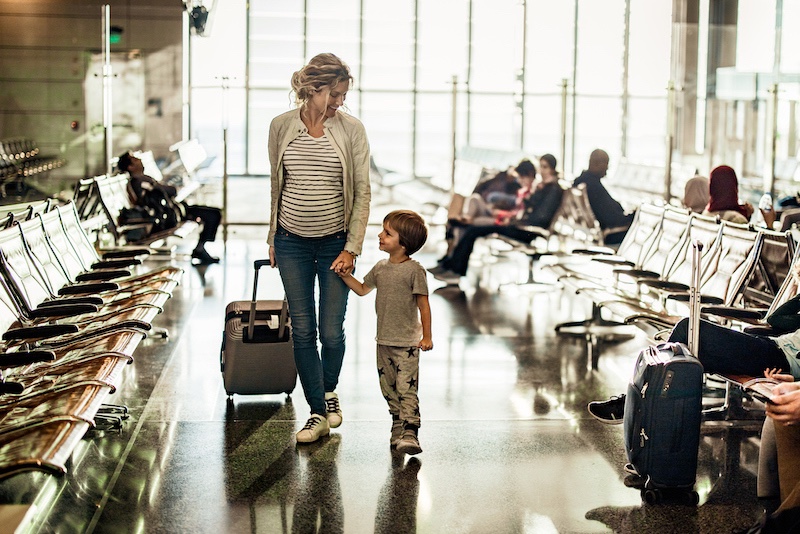
So you’re taking a trip with your growing baby bump. Firstly, congratulations! and secondly, don’t freak out. It’s never been easier to travel while pregnant, there’s just a few things you need to know before you take to the skies.
Plan ahead
Your number one priority before booking that ticket is making sure you’ll be able to fly on your chosen travel dates. For comfort reasons, the second trimester is your safest bet, you ideally won’t be feeling the nausea of the first trimester, and you won’t have to squeeze a giant belly down the aisles. It’s always best to check with your doctor before flying, and you should also check your airlines regulations about pregnant flyers, as some airlines may prevent you from flying later in your third trimester, or require a doctor's note before they allow you to board. You should also make sure you pre-request your seating with your Flight Centre Travel Expert – an aisle seat may make all the difference between a relaxing flight where you can wander the cabin and take plenty of toilet breaks, and a cramped and awkward ordeal. Plus if you are in your first trimester and have nausea, you could also request to be seated in an aisle seat near the toilet, if you need to get there in a hurry.

Get insured
It’s alway important to be insured if you’re heading abroad, so you’ll absolutely need cover if you’re traveling for two. As with your airline’s policy on flying while pregnant, it pays to check the fine print in terms of what you’re covered for, and for how long. Most travel insurance companies won’t cover the pregnancy itself, but may cover issues resulting from the pregnancy, like changes to your flight dates because of morning sickness or fatigue. Rules can be different if you’re expecting multiples, have pre-existing conditions or if you have had issues during your pregnancy, so do a bit of research and make sure you explain everything to your insurance provider. Also each travel insurance has different rules on the latest week you can fly in your third trimester, and this will vary from the airline's rules as well so make sure you check with both your travel insurance and your airline - your Flight Centre Travel Expert can help with this as well. It might be a good idea to also bring a copy of your pre-natal records and medical notes with you should you need to see a doctor while on your trip.
Comfort over fashion
If ever there was a time to think of practicalities over presentation, it’s now. Don your compression socks (but check with your doctor first if they recommend you using these as they may not be advised for some people) and your baggiest maternity trackies, your body will thank you later! It’s not just a matter of comfort – pregnant women are at much greater risk of deep vein thrombosis (when blot clots form in the deep vein of a leg) so it’s important to wear clothes that you can comfortably stretch your legs in. Loose-fitting shoes, or even slip-on shoes, will also help prevent your feet from swelling, and you can kick them on and off easily without having to bend over while on the flight or when you’re going through customs.

Hydrate and keep moving
Did you know your body needs way more water than usual during pregnancy? To build new tissue, maintain amniotic fluid and carry those all-important nutrients to your baby, drinking water is vital, which means you’ll need to up your water intake even more to combat the extreme dryness of the cabin. Bring an extra large water bottle and fill it up once you’ve passed customs, that way you won't have to keep asking the flight crew for glasses of water. You’ll be glad you planned ahead and booked that aisle seat!
It's also a very good idea to keep moving during the flight, whenever the seat belt sign is off and it is safe to do so. It's recommended to try and walk around and stretch every 2 hours on a long flight if possible to help keep your blood flowing and help with the risk of deep vein thrombosis as well.
Take it easy and don't be afraid to ask for help
Remember, your body is busy creating a little person – it’s already working pretty hard, so there’s absolutely no need to strain yourself. If you’re travelling alone, pack light, use a rolling suitcase and don’t be afraid to ask the flight crew for help with your bags when on board. If you’re the stubborn type, check in your luggage so you don’t need to bother with stuffing it overhead. Long haul journey? Bring all the comforts necessary for a restful journey, blanket, pillow, and plenty of snacks included.
Another tip while flying pregnant is to ask for a seat belt extension so you're not trying to squeeze your bump under a tight seat belt. Don't be embarrassed to ask for one, the flight crew is used to it and it is absolutely normal to use one when pregnant. And by having a comfortable seat belt you're not just protecting yourself but also your baby.

Don’t worry
You’ll likely have already received plenty of advice about your pregnancy from friends, family and the internet, some of it helpful, some of it maybe not. The most important thing to remember is that just because you’re pregnant doesn’t mean you need to turn into a hermit, and it’s totally possibly to do most of the things you would usually do (including flying) as long as you put a little extra thought into it. With a few minor adjustments, you and your precious cargo will arrive at your destination just fine.












